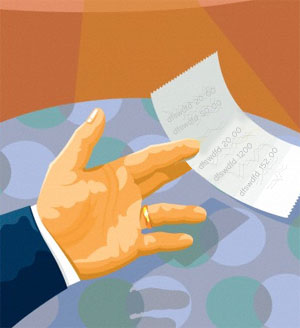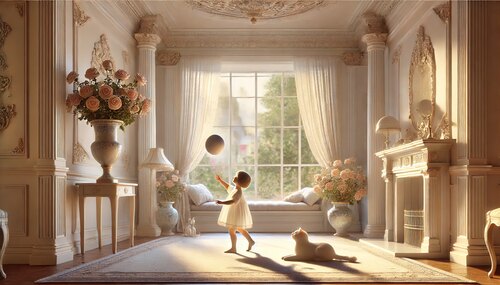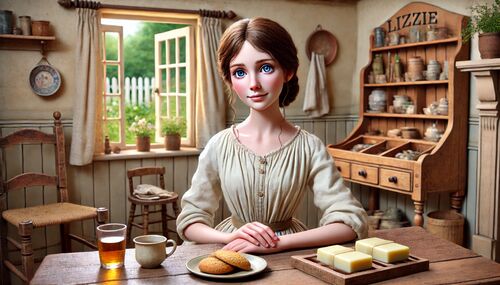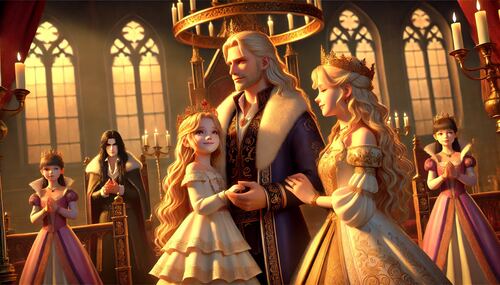Short Stories » Septimus
Septimus Story - Page 17
The queen then summoned the fairy Judicious, and confided the young prince and princess to her care while they should remain at her court, particularly advising her to form their hearts by cultivating their minds ; she embraced Septimus and Feliciana (which was the princess's name), and these amiable children, penetrated with joy and gratitude quitted her arms with sorrow for those of their guardian Judicious.
They profited so well by their education, during the two years they resided with the queen of the fairies, that they obtained the love and admiration of all her court. When the one had reached the age of fourteen and the other of twelve years, the queen of the fairies resolved to unite them in marriage, and to restore them with the brothers and sisters of Septimus to King Petard and his Queen Gilletta ; but at the same tune she informed the Fairy of the Fields that, as an example to Septimus and Feliciana, she had resolved that the rebellious children, although now perfectly cured of their faults, should only resume their proper shapes in the presence of the newly-married couple, and when they should have arrived at the king their father's-palace. Then having determined the time of their departure, she confided to the Fairy of the Fields the six children of whom she had been so careful, and having ordered her to choose for them husbands and wives, she summoned the fairy Judicious, and charged her to accorrpany the Prince Septimus and his princess. These amiable children shed tears on quitting her to whom they owed all their happiness, and the generous queen, embracing them tenderly, promised them her friendship, and saw them depart with much sorrow.
They lost no time in repairing to the court of Petard, where that king had been for some days extremely embarrassed. His mother, the queen, after languishing for many years, had at last vacated the throne, and deputies had been despatched from her kingdom inviting her son to accept the crown. They had already asked for an audience, and Petard was greatly puzzled as to the manner in whichit should be granted. He was uncertain whether he ought to receive them standing or seated, on horseback or on foot, and to debate this point the council was assembled, where everybody decided as usual ; the seneschal Carbuncle maintained that the king ought to be standing, asserting that he had heard, that the Emperor Charlemagne and the twelve peers of France were always standing, and that they never seated themselves except to eat and to sleep. The solicitor-general opined that his majesty should be seated, because kings and judges ought always to be at their ease, and that except a bed, there was nothing so convenient as an arm-chair. The chamberlain, on the contrary, was of opinion, that the king should appear on horseback, alleging that that was the most noble attitude for kings, inasmuch as their statues always thus represented them ; each of the councillors maintained as usual his own opinion ; they shouted, they quarrelled, and would perhaps even have gone farther, if the king, raising his voice above theirs, had not said : "Do you intend to leave off ? there is surely noise enough about a chair more or less ! As I shall meet them, so they shall see me ; and as they find me, so they must take me, that is all I know about the matter ; but as to becoming their king, many thanks to them, I should go mad with all the cares of royalty, which they tell me, I should have on my mind. So, long flourish my little kingdom ; since I am well off with that, I will hold fast to it ; and they must accommodate themselves as well as they can : however, as they wish to have an audience, an audience they must have ; so let them be summoned." The councillors then retired, each murmuring that the king had not taken his advice, and blaming him for always doing as he thought proper for himself.
Septimus - Takeaway for Class 1,2,3
In the story "Septimus," always listen to your heart and be kind, because kindness can lead to unexpected and wonderful adventures.
Septimus - Takeaway for Class 4,5,6
Always treat others kindly, as you never know when you might need their help, just like Septimus learned in the story.
Septimus - Takeaway for Class 7,8,9
Don't judge others based on appearances, as true character and kindness often go beyond what you initially see.
3 Fun Facts
- Septimus, the forgetful wizard, accidentally turns a mouse into a dragon while trying to help a group of villagers.
- Despite his magic mishaps, Septimus learns to use his mistakes creatively and eventually turns the dragon back into the mouse, winning the villagers' trust.
- The story highlights themes of resourcefulness and the value of learning from one's mistakes in a humorous and engaging way.
Quiz for Class 1,2,3
- What did Septimus do that made him feel proud and special?
- Who told Septimus that he had done something very important?
- Why did everyone in the forest celebrate with Septimus at the end?
Quiz for Class 4,5,6
- What magical creature is Septimus, and what special ability does he have?
- How did Septimus plan to show his bravery and help the people of the village?
- Why was the village initially frightened of Septimus, and how did they come to realize he was not a threat?
Quiz for Class 7,8,9
- What role does Septimus play in assisting Mr. Flax with his farm chores?
- How does the discovery of old documents in the attic change Septimus's life?
- What lesson does Septimus learn about responsibility and perseverance through his experiences at the farm?
Was this article useful? What should we do to improve your experience? Share your valued feedback and suggestions!
Help us to serve you better. Donate Now!
















